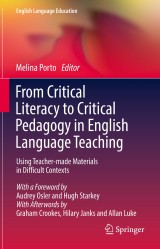Details

From Critical Literacy to Critical Pedagogy in English Language Teaching
Using Teacher-made Materials in Difficult ContextsEnglish Language Education, Band 23
|
96,29 € |
|
| Verlag: | Springer |
| Format: | |
| Veröffentl.: | 16.09.2022 |
| ISBN/EAN: | 9789811657801 |
| Sprache: | englisch |
| Anzahl Seiten: | 207 |
Dieses eBook enthält ein Wasserzeichen.
Beschreibungen
With a Foreword by Hugh Starkey and Audrey Osler, and Afterwords by Graham Crookes, Hilary Janks and Allan Luke, this book promotes critical language education and illustrates how a critical agenda can be enacted in English language education in real classrooms. It presents four cases located in primary and secondary schools in the province of Buenos Aires in Argentina in contexts that can be characterised as vulnerable or difficult. It describes the possibilities, challenges and limitations of this critical agenda using students’ drawings, posters, leaflets, artwork, classroom activities and conversational data as foundation, and including the voices of local teachers in their classrooms. Importantly, these teachers used teacher-made, locally produced, critical post-method materials, described by the author of those materials in one of the chapters. In this way, the book offers a unique balance of researcher, teacher and materials writer voices. These materials are included in the book and can help language teachers around the world to introduce critical perspectives in their specific contexts. The book is appealing to researchers, classroom teachers, teacher educators, and materials writers and developers interested in critical language education.
Introduction.- Part I: Awareness-raising on the Importance of Critical Thinking in ESOL Classrooms.- Chapter One English Language Teaching in Schools that Teach Children to Think Critically.- Part II: Booklets for the Primary and Secondary English Classrooms.- Chapter Two Providing Critical Answers to ESOL Teachers’ Questions in Times of Educational Change.- Part III: Lessons from Four Argentinean Classrooms.- Chapter Three Developing Critical Thinking Skills through Language, Art and Reflection in a Fourth Form English Language Classroom in Argentina.- Chapter Four Critical Thinkers in the Making: 5th Form Argentinian Children Start Thinking Critically as they Explore Different Ways of Interpreting the World and Enhance Human Relationships.- Chapter Five Developing Critical Thinking Skills in a Multi-Grade Classroom in a Rural Primary School in the City of Verónica in Argentina.- Chapter Six A School Visit to the Ecological and Cultural Park William Henry Hudson in Florencio Varela: Developing Critical Thinking in the English Class in a Disadvantaged Secondary School Context in Argentina.- Part IV: A Proposal for Critical Teacher Education.- Chapter Seven Teacher Education for Critical Practice in ESOL.- Chapter Eight Critical Literacy: Integrating the Imaginative, Moral, Ethical and Citizenship Dimensions in the Foreign Language Classroom.
Melina Porto is a researcher at the National Research Council in Argentina (CONICET) in Argentina, Professor at Universidad Nacional de La Plata (Argentina), Honorary Research Fellow at the University of East Anglia (UEA) in UK (2019-2024). She was Visiting Academic at UEA (2012-2018). She holds an MA in English Language Teaching from Essex University, a PhD in Sciences of Education from Universidad Nacional de La Plata, and a postdoctoral degree in Humanities and Social Sciences from Universidad de Buenos Aires. Her current research interests include intercultural citizenship in the language classroom, critical pedagogies, and teacher education, among others.
With a Foreword by Hugh Starkey and Audrey Osler, and Afterwords by Graham Crookes, Hilary Janks and Allan Luke, this book promotes critical language education and illustrates how a critical agenda can be enacted in English language education in real classrooms. It presents four cases located in primary and secondary schools in the province of Buenos Aires in Argentina in contexts that can be characterised as vulnerable or difficult. It describes the possibilities, challenges and limitations of this critical agenda using students’ drawings, posters, leaflets, artwork, classroom activities and conversational data as foundation, and including the voices of local teachers in their classrooms. Importantly, these teachers used teacher-made, locally produced, critical post-method materials, described by the author of those materials in one of the chapters. In this way, the book offers a unique balance of researcher, teacher and materials writer voices. These materials are included in the book and can help language teachers around the world to introduce critical perspectives in their specific contexts. The book is appealing to researchers, classroom teachers, teacher educators, and materials writers and developers interested in critical language education.
Uses teacher-made materials to enact critical pedagogies in ELT in contexts with difficult circumstances With a Foreword by Audrey Osler and Hugh Starkey With Afterwords by Graham Crookes, Hilary Janks and Allan Luke


















